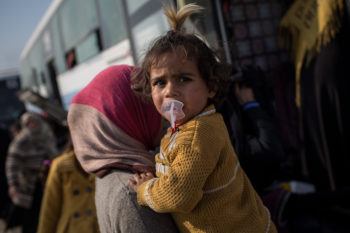Violent Conflict’s Effect On Breastfeeding

Death and destruction are common measures of the direct cost of armed conflict, but indirect household decisions can also have long-term consequences. Not only does war affect the health of a population, according to a paper co-authored by a Texas A&M University researcher, it can lead to a reduction in breastfeeding.
The importance of breastfeeding and nursing is clear, said George Naufal of the Public Policy Research Institute at Texas A&M, but the relationship between the intensity of armed conflict and breastfeeding practices is understudied. Along with co-authors from the Overseas Development Institute and West Chester University, Naufal compared breastfeeding rates among women who lived in high-conflict areas in Iraq with those who lived in lower-conflict areas in 2006 and 2011.
“On one hand, women and mothers cannot go to the store and get food or milk for their newborn infants,” Naufal said of life in a conflict zone. “But at the same time, women who rely more on nursing but are stressed and not eating well or drinking enough water may not produce enough milk. The question could have gone either way, and we had to look at it.”
They found that conflict intensity is negatively associated with breastfeeding rates, including an associated 3.75 percent decline in the probability that a child had ever been breastfed for every additional casualty per 1,000 people. An increase in conflict-related casualties in the most dangerous Iraqi governorate was associated with an estimated 8.5 percent decline in the probability that a child was currently being breastfed, and a roughly 5 percent decline in the probability that a child had ever been breastfed.
While the authors found that an increase in casualties from armed conflict is associated with reductions in breastfeeding rates, there were mixed results regarding the duration that a mother breastfeeds.
Naufal said the researchers used data from surveys developed by the United Nations Children’s Fund that aim to capture information on the status of women and children in countries around the world. The data, primarily from rounds of the survey conducted in 2006 and 2011, comprise the information available following the U.S. invasion of Iraq in 2003. Mothers who had given birth in the past two years answered questions such as whether they had whether breastfed their last-born child and how long they did so after birth.
The authors note in their paper that breastfeeding of infants under two years old has the potential to prevent about 800,000 deaths annually of children under the age of five in developing countries.
The findings have major policy implications for the United Nations and other agencies that send food and other supplies, including formula for infants, to high-conflict areas, Naufal said.
“If the armed conflict is already affecting the likelihood of breastfeeding and you are perhaps worried about long-term effects of children and infants being raised without being breastfed, those decisions with international agencies now becomes very important,” Naufal said. “Do you provide more formula or less formula in the donations? If you provide more formula, you may decrease the likelihood of breastfeeding even further because now you’re providing a very clear substitute, but at the same time, you realize that infants are malnourished.”
Still, the literature on the effects of armed conflict on household decisions is scarce, Naufal said. Those could result in long-term consequences decades from now, he said, stemming from a generation that wasn’t nourished properly during infancy or endured abuse and child labor.
“Any research moving forward looking at the effects of armed conflict on household decision-making is very important,” Naufal said.
Media contact: Caitlin Clark, 979-458-8412, caitlinclark@tamu.edu.





